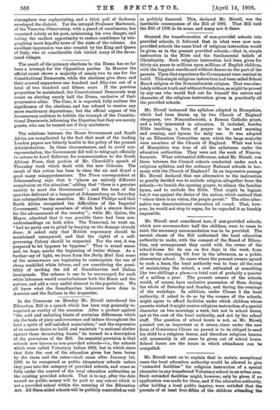The relations between the Home Government and South Africa are
complicated by the fact that most of the leading London papers are bitterly hostile to the policy of the present Administration. In these circumstances, and to avoid mis- representation, the Government did well to telegraph officially in extenso to Lord Selborne, for communication to the South African Press, that portion of Mr. Churchill's speech of Thursday week which dealt with the new Colonies. The result of this action has been to clear the air and dispel a good many misapprehensions. The Times correspondent at Johannesburg says that it "places an entirely different complexion on the situation," adding that "there is a genuine anxiety to meet the Government " ; and the tone of the speeches delivered at a banquet at Johannesburg on Saturday last substantiates the assertion. Mr. Lionel Phillips said that South Africa recognised the difficulties of the Imperial Government, "many members of which had a sincere desire for the advancement of the country " ; while Mr. Quinn, the Mayor, admitted that it was possible there had been mis- understandings on both sides. The Transvaal, he went on, "had no party axe to grind by harping on the damage already done ; it asked only that British supremacy should be maintained unimpaired, and that the rights of a self- governing Colony should be respected. For the rest, it was prepared to let bygones be bygones." That is sound sense, and, we hope, marks the beginning of better things. As a further ray of light, we learn from the Daily Mail that some of the mineowners are beginning to contemplate the use of cheap unskilled white labour, and are considering the possi- bility of inviting the aid of Scandinavian and Italian immigrants. The scheme is one to be encouraged, for such white labourers would counterbalance both the Boers and the natives, and add a very useful element to the population. We all know what the Scandinavian labourers have done in America and the Italians in the Argentine.






































 Previous page
Previous page